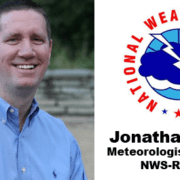TownTalk: Town Of Kittrell Has An Interesting Story To Tell
Kittrell Drew Visitors From All Over With Mineral Springs, Hotels…
Is it possible that the passage of the Pure Food and Drug Act in 1901 could have played even a small role in the fate of the Vance County town of Kittrell?
Maybe.
Driving on US 1 through Kittrell today, you’d never know that Kittrell had been home to hotels and resorts that drew visitors from all over. People convalescing from tuberculosis came for the mineral springs and Northerners came to hunt and escape cold winters, according to Mark Pace, local historian. Pace and Bill Harris shared stories about the tiny town of Kittrell on Thursday’s Town Talk as part of an ongoing conversation about local history.
“Kittrell really takes off when the railroad came through,” said Mark Pace, during Thursday’s Town Talk with co-host Bill Harris. In the late 1800’s it was called Kittrell’s Depot – plural because there were two depots, one for passengers and one for commercial use. About the time that the railroad came through, they found a mineral spring, which launched a host of hotels and lodges that brought people from all over to the small Vance County town.
Back at the turn of the 20th century, Census records showed that Kittrell had 168 residents – just about what it has today. But that number back in 1900 is half of what the population had been just 10 years earlier.
Why the drop? “The hotels had closed up by that point,” Pace said.
“Kittrell had its day,” he said. It had its own downtown district, hotels – it was famous throughout the South, complete with fine old homes and historic buildings.
Several families, including the Kittrells, gave land for the railroad to come through. “Kittrell really takes off when the railroad comes through,” Pace said. In the mid-1850’s, the town was called Kittrells – because there were two train depots, one for passengers headed to the hotels and resorts and a second for freight. Along about the time the railroad began chugging through, there was a discovery of a mineral springs. And from the late 1850’s until World War 1, Kittrell was in its heyday.
Over a period of about 30 years, there were four hotels in Kittrell: Located where the Dollar General now stands was Kittrell Springs. It could accommodate 600 guests; and the Davis Hotel, or Glass House, had space for 800 people.
The Glass House, so named because glass porches on either side of the hotel was where people with tuberculosis could be cared for indoors by staff nurses while enjoying the sunlight. The destination was so popular, folks even rented out rooms in private homes. In 1867, Pace said that all the hotels 500 people were turned away. There was no more room.
But after the Golden Era of the resort – after the end of the Civil War and just prior to World War I – interest in Kittrell fell off.
The healing and restorative powers of the mineral springs were largely debunked by the Pure Food and Drug Act. And the bottled water, promising help to those suffering from dyspepsia to female ailments, lost traction in the national market.
The hotels and opera houses, billiard rooms and downtown district are long gone. But the stories remain.
For complete details and audio click play.










